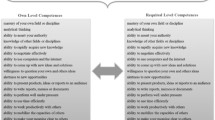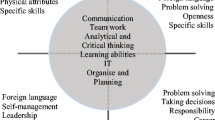Abstract
This paper presents the main results obtained from 40 in-depth interviews with persons in charge of human resources and/or company directors, and from a questionnaire targeting 872 companies surveyed from a data base of the 5,000 main Spanish companies. The objectives of this paper are the following: first, to identify the competencies required of university graduates by the labour market; second, to find out the mismatches that may exist between the current higher education students receive and company demands; and third, to discover how and to what extent universities can improve their education and training in order to reduce the gap that, according to employers, exists between current business needs and the education that graduates have upon entering the labour market. To carry out this research project, the competencies under study have been divided into two large groups: vocational and generic. At the same time, the latter have been subdivided into three subgroups: knowledge-related, methodological, and interpersonal competencies.
Similar content being viewed by others
References
Actualidad Económica. (2004). Las 5000 mayores empresas [ The 5000 most important companies] (Edición 2004, CD-ROM). Madrid: Actualidad Económica.
Allen, J., Inenaga, Y., van der Velden, R., & Yoshimoto, K. (Eds.) (2007). Competencies, higher education and career in Japan and the Netherlands (Higher Education Dynamics, 21(Series)). Dordrecht: Springer.
Allen, J., & Ramaekers, G. (2006). Survey among employers of alumni from the Faculty of Economics and Business Administration of Universiteit Maastricht (Series: ROA-R-2006/1E). Maastricht: Faculty of Economics and Business Administration, Maastrich University.
ANECA (Agencia Nacional de Evaluación de la Calidad y Acreditación). (2004). Las empresas y la inserción laboral de los universitarios [Companies and graduates’ transition into the labour market]. Madrid: ANECA.
Ayats, C., Zamora, P., & Desantes, R. (2004). Los titulados de la Universidad Politécnica de Valencia y los empleadores [Graduates of Valencia Politechnic University and employers]. Valencia: Servicio de Publicaciones de la Universidad Politécnica de Valencia.
Becker, G. S. (1993). Human capital: A theoretical and empirical analysis with special relevance to education. New York: Columbia University Press.
Bennett, N., Dunne, E., & Carré, C. (2000). Skills development in higher educaction and employment. Buckingham: SRHE/Open University Press.
Birkett, W. P. (1993). Competency based standards for professional accountants in Australia and New Zealand. Melbourne: Australian Society of Certified Practising Accountants.
Boersma, F. K., Reinecke, C. J., & Gibbons, M. (2008). Organizing the university–industry relationship: A case study of research policy and curriculum restructuring at the North-West University in South Africa. Tertiary Education and Management, 14(3), 209–226.
Braunstein, L. A., & Loken, M. K. (2004). Benefits of cooperative education for employers. In R. K. Coll & C. Eames (Eds.), International handbook for cooperative education: An international perspective of the theory, research and practice of work-integrated learning. Boston, MA: World Association for Cooperative Education.
Bunk, G. P. (1994). Teaching competence in initial and continuing vocational training in the Federal Republic of Germany. Vocational Trainig European Jorunal, 1, 8–14.
Burchell, N., Hodges, D., & Rainsbury, E. (2001). What competencies do business graduates require? Perspectives of New Zealand stakeholders. Journal of Cooperative Education, 35(2–3), 11–20.
Calway, B. A., & Murphy, G. A. (2007). The educational imperatives for a work-integrated learning philosophy. Journal of Cooperative Education and Internships, 41(2), 12–22.
Candy, P. C., & Crebert, R. G. (1991). Ivory tower to concrete jungle: The difficult transition from the academy to the workplace as learning environments. Journal of Higher Education, 62(5), 570–592.
CEMRHE. (2005, May 19–20). The European higher education area: Achieving the goals. Communiqué of the Conference of European Ministers Responsible for Higher Education (CEMRHE), Bergen.
Coll, R. K., & Zegwaard, K. E. (2006). Perceptions of desirable graduate competencies for science and technology new graduates. Research in Science & Technological Education, 24(1), 29–58.
Crebert, G., Bates, M., Bell, B., Patrick, C. J., & Cragnolini, V. (2004). Ivory Tower to concrete jungle revisited. Journal of Educaction and Work, 17(1), 47–70.
De Weert, E. (2007). Graduate employment in Europe: The employers’ perspective. In U. Teichler (Ed.), Careers of university graduates: Views and experiences in comparative perspectives. (Higher Education Dynamics, 17(Series)). Dordrecht: Springer.
Dearing, R. (1997). Higher education in the learning society (Report of the National Committee of Inquiry into Higher Education). London: NCIHE.
DEST (Department of Education, Science and Training). (2001). Higher education report for the 2002 to 2004 triennium. Canberra: Commonwealth Department of Education, Science and Training.
DEST (Department of Education, Science and Training). (2007). Graduate employability skills. Canberra: BIHECC.
Dunne, E., Bennett, N., & Carre, C. (1997). Higher education: Core skills in a learning society. Journal of Educaction Policy, 12(6), 511–25.
García-Aracil, A., Mora, J. G., & Vila, L. E. (2004). The rewards of human capital competences for young European higher education graduates. Tertiary Education and Management, 10(4), 287–305.
García-Montalvo, J., & Mora, J. G. (2000). El mercado laboral de los titulados superiores en Europa y en España [The labour market for graduates in Europe and in Spain]. Papeles de Economía Española, 86, 111–127.
Goldschmidt, N. P. (2005). Lessons learned from surveying employers. Assessment Update, 17(4), 1–13.
González, J. & Wagenaar, R. (2003). Tuning educational structures in Europe. Bilbao: University of Deusto.
Graham, C., & McKenzie, A. (1995). Delivering the promise: The transition from higher education to work. Education + Training, 37(1), 4–11.
Handel, M. J. (2003). Skills mismatch in the labour market. Annual Review of Sociology, 29(1), 135–165.
Harvey, L. (2000). New realities: The relationship between higher education and employment. Tertiary Education and Management, 6(1), 3–17.
Harvey, L., & Green, D. (1994). Employer satisfaction. Birmingham: Centre for Research into Quality (CRQ).
Harvey, L., Moon, S., Geall, V., & Bower, R. (1997). Graduates’ work: Organisational change and students’ attributes. Birmingham: Centre for Research into Quality (CRQ).
Heijke, H., Meng, C., & Ris, C. (2003). Fitting to the job: The role of generic and vocational competencies in adjustment and performance. Labour Economics, 10(2), 215–229.
Heldrich, J. J. (2005). Survey of New Jersey employers to assess the ability of higher education institutions to prepare students for employment. Trenton, NJ: Commission on Higher Educaction.
Hernández-March, J., Martín del Peso, M., Rabadán, A. B., & Leguey, S. (2007). Desajustes entre formación universitaria y empleo desde la óptica empresarial: Un análisis cuantitativo y cualitativo [Mismatch between higher education and employment from the companies’ point of view. A quantitative and qualitative analysis]. Madrid: Centro Universitario de Estudios Sociales Aplicados, Universidad Rey Juan Carlos.
Hesketh, A. J. (2000). Recruiting and elite? Employers’ perceptions of graduate education and training. Journal of Education and Work, 13(3), 245–271.
Hodges, D., & Burchell, N. (2003). Business graduate competencies: Employers’ views on importance and performance. Asia-Pacific Journal of Cooperative Education, 4(2), 16–22.
Hutcheson, P. (1999). Educating a globally productive citizenry: The role of higher education in the integration of learning and work (A monograph for college leaders). Boston, MA: National Commission for Cooperative Education.
Knouse, S. B., Tanner, J. T., & Harris, E. W. (1999). The relation of college internships: College performance and subsequent job opportunity. Journal of Employment Counseling, 36(1), 35–43.
Kohler, J. (2004, October 22). The Bologna process and employability: The impact of employability on curricular development. Paper presented at the Key Objective of Academic Studies and for Academic Institutions Conference, Bled.
Manninen, J., & Hobrough, J. (2000). Skills gaps and overflows? Industry & Higher Education, 14(1), 51–57.
Martin, E. (1997). The efectiveness of different models of work-based university education (Department of Education, Training and Youth Affair). Canberra: McMillan Printing Group.
McClelland, D. C. (1973). Testing for competence rather than for intelligence. American Psychologist, 28(1), 1–14.
Mora, J., García-Aracil, A., & Vila, L. E. (2007). Job satisfaction among young European higher education graduates. Higher Education, 53(1), 29–59.
Murphy, G. A., & Calway, B. A. (2008). Skilling for the workforce: A tertiary education response to enrich professional development. Tertiary Education and Management, 14(2), 95–109.
Peter D. Hart Research Associates, Inc. (2008). How should colleges assess and improve student learning? Employers’ views on the accountability challenge (A survey of employers conducted on behalf of the Association of American Colleges and Universities). Washington, DC: Peter D. Hart Research Associates.
Purcell, K., Elias, P., Davies, R., & Wilton, N. (2005). The class of’ 99: A study of the early labour market experience of recent graduates (DfES Research Report No. 691). London: Department for Education and Skills.
Purcell, K., Elias, P., & Wilton, N. (2004). Higher education, skills and employment: Careers and jobs in the graduate labour market (Graduate Careers Seven Years, Research Paper No.3). Warwick: IER Warwick/ESRU UWE.
Purcell, K., Morley, M., & Rowley, G. (2002). Employers in the new graduate labour market: Recruiting from a wider spectrum of graduates. London: Council for Industry and Higher Education.
Reinecke, C. J. (1998). Research policy as an integral part of a university’s strategic planning. SAUVCA Publication Series, 98(3), 47–59.
Reiter-Palmon, R., Young, M., Strange, J., Manning, R., & James, J. (2006). Occupationally-specific skills: Using skills to define and understand jobs and their requirements. Human Resource Management Review, 16(3), 356–375.
Semeijn, J., Boone, C., van der Velden, R., & van Witteloostuijn, A. (2005). Graduatess’ personality characteristics and labor market entry: An empirical study among Dutch economics graduates. Economics of Education Review, 24(1), 67–83.
Schomburg, H., & Teichler, U. (2006). Higher education and graduate employment in Europe: Results from graduate surveys from twelve countries (Higher Education Dynamics, 15(Series)). Dordrecht: Springer.
Vaatstra, R., & de Vries, R. (2007). The effect of the learning environment on competences and training for the workplace according to graduates. Higher Education, 53(3), 335–357.
VanderHeide, T. (2008). Employer survey report. Edmonton: Grant MacEwan College.
Van der Velden, R., & Allen, J. (2007, June 28–29). The flexible professional in fthe knowledge society: General results. Paper presented for the conference: The Flexible Professional in the Knowledge Society, Madrid.
Author information
Authors and Affiliations
Corresponding author
Rights and permissions
About this article
Cite this article
Hernández-March, J., Martín del Peso, M. & Leguey, S. Graduates’ Skills and Higher Education: The employers’ perspective. Tert Educ Manag 15, 1–16 (2009). https://doi.org/10.1080/13583880802699978
Published:
Issue Date:
DOI: https://doi.org/10.1080/13583880802699978




